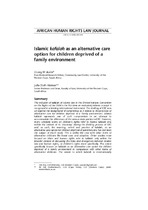| dc.contributor.author | Sloth-Nielsen, Julia | |
| dc.contributor.author | Assim, Usang Maria | |
| dc.date.accessioned | 2015-10-29T17:26:49Z | |
| dc.date.available | 2015-10-29T17:26:49Z | |
| dc.date.issued | 2014 | |
| dc.identifier.citation | Assim, U. M. and Sloth-Nielsen, J. (2014). Islamic kafalah as an alternative care option for children deprived of a family environment. African Human Rights Law Journal, 14(2): 322 - 345 | en_US |
| dc.identifier.issn | 1609-073X | |
| dc.identifier.uri | http://hdl.handle.net/10566/1938 | |
| dc.description.abstract | The inclusion of kafalah of Islamic law in the United Nations Convention on the Rights of the Child is the first time an exclusively Islamic concept is recognised in a binding international instrument. The drafting of CRC was set against the background of compromise as it relates to the provision of alternative care for children deprived of a family environment. Islamic kafalah represents one of such compromises in an attempt to accommodate the differences of the various state parties to CRC. However, many scholarly works on children’s rights refer to Islamic kafalah only within the context of its ‘discovery’ during the drafting process of CRC and, as such, the meaning, extent and practice of kafalah, as an alternative care option for children deprived of parental care, has not been the subject of much study. This is unlike the case with other forms of alternative childcare like foster care and adoption. Other studies more focused on Islam and human rights refer to kafalah only within the broader context of discussing the links and divergences between Islamic law and human rights, or children’s rights more specifically. This article specifically focuses on kafalah as an alternative care option for children deprived of a family environment in comparison with other forms of alternative childcare. The extent to which kafalah is internationally recognised and practised is also addressed. A number of themes are analysed in the article, including what the concept of kafalah entails, what its legal implications are, what factors distinguish it from other forms of alternative care, and what the international dimensions to kafalah are in relation to the subject of intercountry adoption. In light of all these questions, an understanding of kafalah will contribute to international children’s rights jurisprudence in the context of child care and protection. | en_US |
| dc.language.iso | en | en_US |
| dc.publisher | Juta Law | en_US |
| dc.rights | The AHRLJ is an Open Access journal. The published online version of this article is available at http://www.ahrlj.up.ac.za/assim-u-m-sloth-nielsen-j. | |
| dc.subject | Kafalah | en_US |
| dc.subject | Alternative care | en_US |
| dc.subject | Islamic law | en_US |
| dc.subject | Family environment | |
| dc.subject | Children's rights | |
| dc.subject | Adoption | |
| dc.title | Islamic kafalah as an alternative care option for children deprived of a family environment | en_US |
| dc.type | Article | en_US |
| dc.privacy.showsubmitter | false | |
| dc.status.ispeerreviewed | true | |
| dc.description.accreditation | International Bibliography of Social Sciences | en_US |

